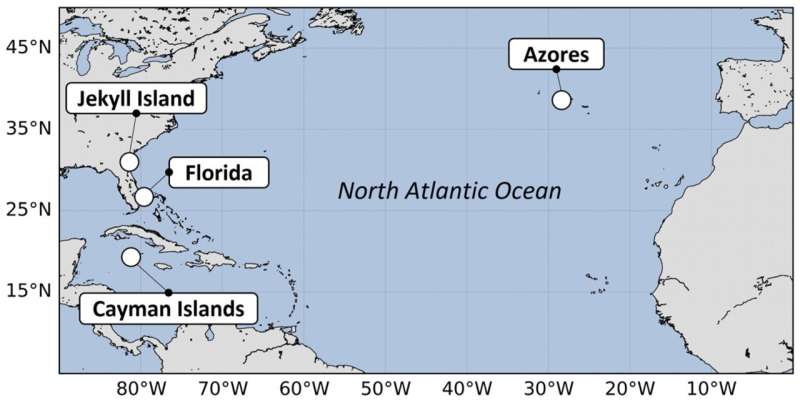This article has been reviewed according to Science X's editorial process and policies. Editors have highlighted the following attributes while ensuring the content's credibility:
fact-checked
peer-reviewed publication
proofread
Novel microsatellite tags hold promise for illuminating sea turtles' cryptic lost years

In the new article "Novel Microsatellite Tags Hold Promise for Illuminating the Lost Years in Four Sea Turtle Species" published in Animals, researchers tested new prototypes of microsatellite tags on 160 juvenile sea turtles of four species in the North Atlantic and analyzed the tags' performance. These findings have important implications for the bio-logging community, especially those studying marine animals such as sea turtles.
Observing juvenile sea turtles at sea is challenging due to their small sizes and cryptic behaviors and is compounded by the vastness of the ocean. The first phases of sea turtle life history, commonly known as the "Lost Years," remain enigmatic and poorly understood despite significant advances in animal and ocean observation technologies.
The results of the tags analysis demonstrated that, despite challenges brought by miniaturization, the tags proved effective. Tracking durations varied among species, indicating some limitations due to certain behaviors such as neritic interactions or diving activity by young sea turtles and revealing that some of their behaviors may be too strenuous for small tags.
This study showcases recent technological advances and contributes to improving the effectiveness and durability of miniaturized satellite tags deployed within the marine environment. The methodologies and findings show promise to inform ongoing future technological advances and contribute to increasing the effectiveness of conservation efforts.
This research is part of Upwell's Lost Year's Initiative, an international collaborative effort to explore the promise of new tag miniaturization technologies and their potential to shed light on the "lost years" period of sea turtle life history. The manuscript is lead-authored by Tony Candela, Oceanographer and Marine Ecosystem Modeler for Upwell, Mercator Ocean International and for the Center d'Etude et de Soin des Tortues Marines (CESTM) of the Aquarium of La Rochelle. Tony is also a Ph.D. student at the University of Toulouse in France.
The manuscript was produced by an international team of collaborators, including Upwell, Mercator Ocean International, Aquarium La Rochelle, Center d'Etudes et de Soins pour les Tortues Marines, FAU Marine Science Laboratory, Department of Biological Sciences, Florida Atlantic University, Lotek Wireless, Inc., Institute of Marine Science, IICM Okeanos, University of the Azores, Institute of Marine Research (IMAR), Georgia Sea Turtle Center, Jekyll Island Authority, Cayman Turtle Conservation and Education Center, the Department of Environmental Biology, SUNY College of Environmental Science and Forestry, School of Biological Sciences, Monash University, Flying Sharks, and MigraMar.
More information: Tony Candela et al, Novel Microsatellite Tags Hold Promise for Illuminating the Lost Years in Four Sea Turtle Species, Animals (2024). DOI: 10.3390/ani14060903
Journal information: Animals




















